The debate around assisted dying needs clarity if we are to progress
Assisted dying, euthanasia and assisted suicide are not synonymous. This life and death matter must be handled with sensitivity, clarity of language and nuanced understanding. Enis Yucekoralp reports


There is an imperative caveat to the discussion around assisted dying. This is quite literally a matter of life and death: sensitivity and the respect of terminally ill people will always be paramount. The discourse itself is suffused with ethical debate and riven by moral quandary, but there is also both rhetoric and evidence to use.
Though there is demonstrable public support to legalise assisted dying, there is also staunch opposition. Many organisations and individuals argue for assisted dying on the grounds of personal liberty and the alleviation of suffering, but for some there remain some points of contention and doubt.
These include those which have been raised by disability rights campaigners, religious groups, parts of the palliative care community, and members of government. It is, then, a topic for politics and medical ethics as much as it is of morality.
One of the most pressing issues of the debate is that the definitions of the discourse are disputed, causing confusion over the terminology used to describe the process of assisted dying.
Clarity is required in this debate. What the discussion requires is a precise glossary of terms because the language matters and certain terms can be misleading.
Dignity in Dying are one of the UK’s leading assisted dying campaign organisations. Polling conducted by YouGov in August 2021 and published as part of Dignity in Dying’s recent report, Last Resort, reveals that seven in 10 (73 per cent) people in the UK recognise that there is a distinction between a terminally ill adult seeking assistance to end their life, and suicide.
As Marjorie Wallace, chief executive and founder of mental health charity Sane, wrote in the Mirror recently: “To conflate shortening life with shortening death does a disservice to both suicide prevention and to end-of-life care. Recognition of this distinction and an appropriate use of language are vital if we are to ensure that everyone receives compassionate care for their individual needs throughout their life, as well as at its end.”
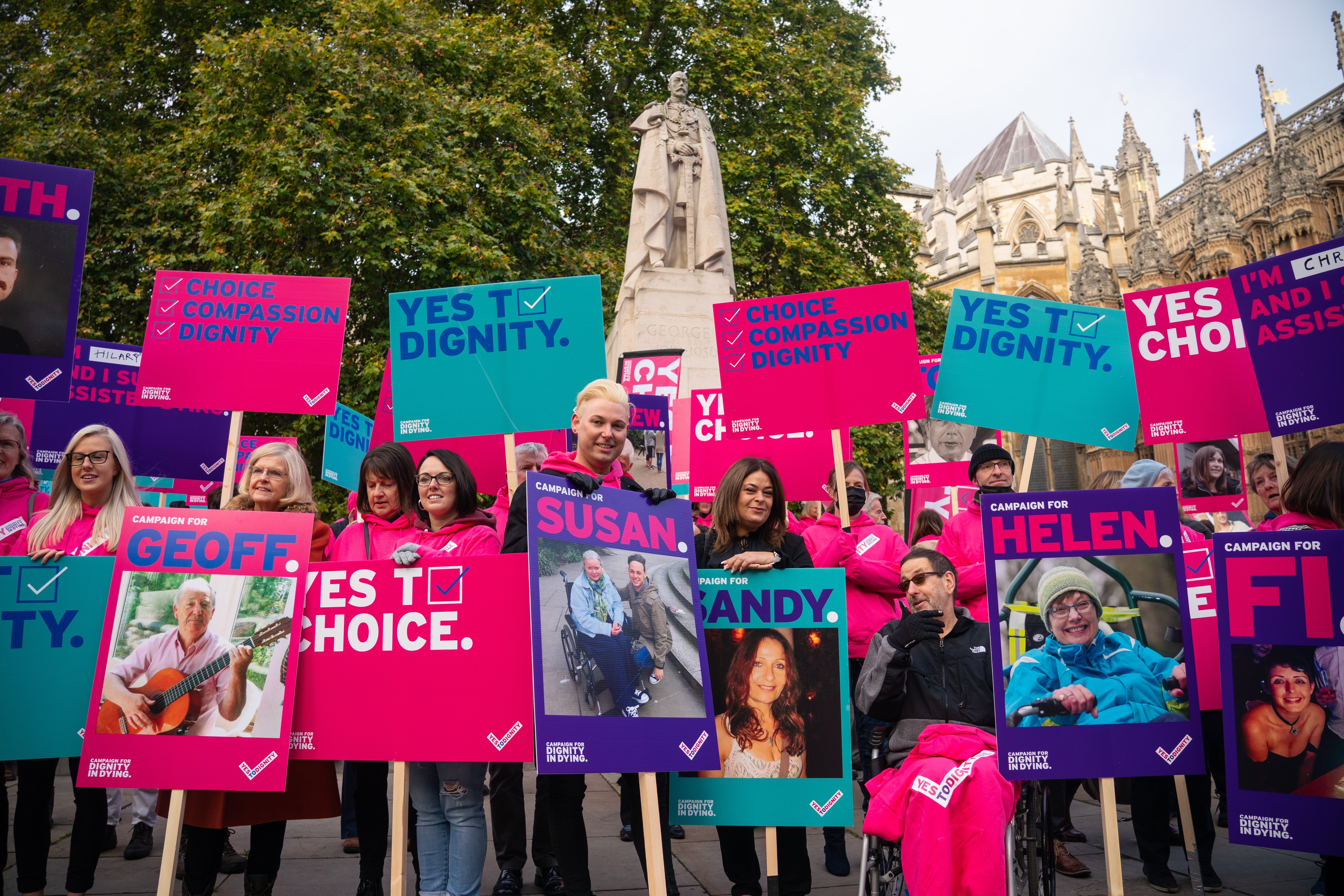
To be clear, assisted dying is the idea that a terminally ill person should have the ability to accelerate an unbearable and imminent dying process. This stands in contrast to assisted suicide, assisted dying for those who are not dying, or euthanasia, which would allow doctors to end the lives of their patients.
At root, assisted dying allows a terminally ill person the option to control the timing and manner of their imminent death if they decide their suffering to be unbearable. Haemorrhaging, perforated bowels, intractable vomiting, malignant fungating wounds, and intense unrelieved muscle and joint pain being just some examples of the agony some people have to endure.
It seems clear that there are changing views on the subject of assisted dying, but we should be wary of trying to theorise too abstractly about a situation which has at its base the practical, lived realities of thousands of people in the UK.
Assisted dying is banned in England and Wales under the 1961 Suicide Act and in and in Northern Ireland under the Criminal Justice Act (1966): it carries a maximum jail term of 14 years. Under the current law, it is an offence to encourage or assist the death of another person; but it is legal to travel abroad for an assisted death if it is legally permitted in that jurisdiction.
However, a private member’s bill that has been proposed by crossbench peer and chair of Dignity in Dying, Baroness Molly Meacher, would seek to change the legislation. Its aim is to make assisted dying a choice for terminally ill, mentally competent adults in their final six months of life.
The legal, medical and social implications of the bill for disabled people are enormous. They need to know that doctors are obliged to do all they can to help everyone to live a good life
Practically, what the Assisted Dying Bill 2021 proposes is an assisted dying process overseen by a range of safeguards and criteria. Any request for an assisted death would need to be agreed upon by two independent doctors, together with a high court judicial ruling before a dying individual’s case could be sanctioned.
The bill comes amid the government of Jersey’s historic vote in the state assembly on 25 November 2021. Jersey now looks set to potentially become the first place in Britain to approve assisted dying after around 90 per cent of voters agreed and a citizen’s jury verdict strongly recommended a change to the law. As a British Crown dependency, Jersey can legislate on the issue independently from Westminster.
In Scotland, too, proposals put forward by Liberal Democrat MP, Liam McArthur, have received cross-party support in Holyrood. The Assisted Dying Scotland Bill, which was lodged in June of this year, is the third such attempt after previous attempts were voted down in 2010 and 2015. A consultation of its contents is currently ongoing, but the proposed law features similar transparent and robust safeguards to Baroness Meacher’s version.
With respect to the latter, currently in the House of Lords, despite perceived support for the idea among the public, the bill has also evoked an outcry of criticism. That the UK has been unable to resolve the question around assisted dying is unsurprising given the philosophical and equivocal nature of the politics of mortality.
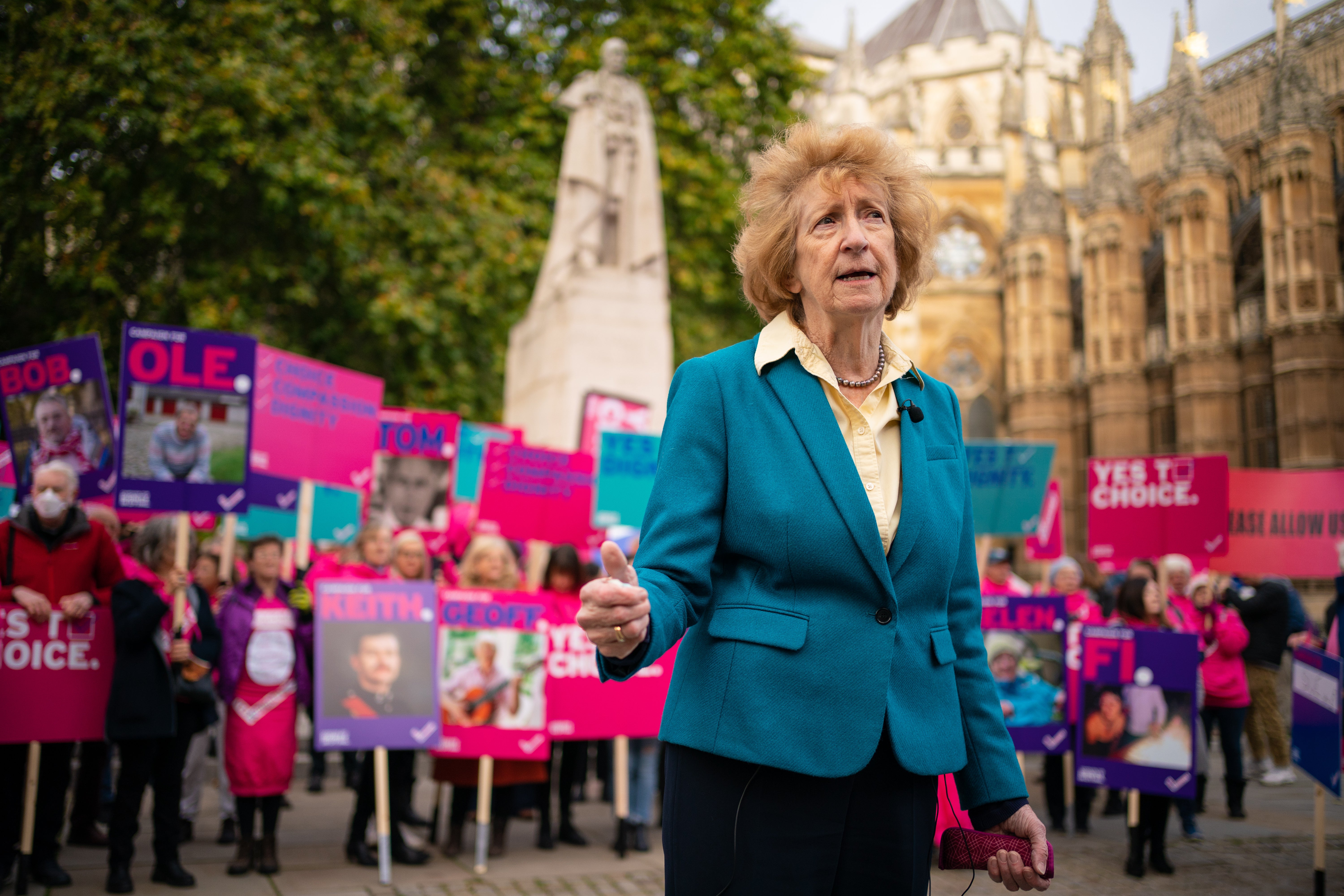
Baroness Meacher’s bill comes as part of a legislative lineage. There have been similar attempts to change the law on assisted dying in the past: from Lord Falconer’s bill in 2014 to Rob Marris’ Assisted Dying Bill that followed it in 2015. The latter was defeated by a parliamentary majority of 330 to 118 in the House of Commons.
Even if MPs had voted in favour, its chances of becoming law would have been very low; then-Prime Minster David Cameron had openly declared in 2014 that he was not in support of legalising assisted dying. To achieve any level of success, any private member’s bill needs at least some level of government support.
Having had its first reading in May 2021, the bill then passed its second reading on 22 October after a wide-ranging ethical debate that included nearly 140 members and spanned over many hours. Some argued for freedom of choice at the end of life, while around 60 peers opposed the bill, flagging worries and anxieties about safeguards for vulnerable people.
However, the bill has now moved procedurally to committee stage in the House of Lords. A large proportion of Peers spoke out against it and its progress is seemingly being held up by reams of amendments tantamount to a filibustering strategy at its committee stage.
The bill needs government support if it is to be allowed the parliamentary time it requires to be debated in the House of Commons. Given the gravity of its scope, the public interest, and the ramifying momentum of similar votes in Jersey and Scotland it remains to be seen whether it will receive that endorsement.
After the second stage of the assisted dying bill, Baroness Finlay of Llandaff, officer of the All-Party Parliamentary Group for Dying Well and a professor of palliative medicine, said: “Peers have today demonstrated a powerful opposition to this bill. Instead, the focus should be on pressing the Government to do more to ensure good palliative and end-of-life care for everyone, everywhere in this country.”
Also in opposition, Baroness Grey-Thompson DBE, crossbench life peer and Paralympic athlete, said: “The legal, medical and social implications of the bill for disabled people are enormous. They need to know that doctors are obliged to do all they can to help everyone to live a good life. The current law keeps unconscious discrimination and social bias towards disabled people in check.”
However, Baroness Meacher herself, speaking after the debate in October, said: “It was powerful to see so many Peers from all sides of the House united in support of my bill, and queuing up to speak in favour. The House of Lords clearly recognises that it is time to reform our outdated laws, as do the overwhelming majority of the British public. That strength of feeling was demonstrated by the huge gathering of supporters outside the House.
“This issue is not going away. Change is now inevitable, with more countries around the world bringing in assisted dying laws and none repealing them… It is only a matter of time before Parliament catches up with public opinion and does the right thing.”
The pro-legalisation school of thought teaches that assisted dying – properly strategised – would create a more compassionate, humane society with safer protocols for end-of-life decisions and greater licence for terminally ill individuals.
There are far more doctors who are prepared to be involved than there are patients who would need an assisted death: that’s the bottom line
In the main, opposition arguments centre around concern for the susceptibility and wellbeing of vulnerable people and those with disabilities, an anxiety about consequences from the so-called “slippery slope”, the religious and moral objection to the idea, and a semantic unease that the public may not fully comprehend what assisted dying actually means in real terms.
A recent Survation poll of 1,032 people, conducted by the All-Party Parliamentary Group for Dying Well, suggested that 43 per cent of respondents correctly understood what assisted dying was. The APPG for Dying Well is a network of MPs and peers which promotes access to high-quality palliative care and is opposed to the legislation of what they term “doctor assisted suicide” in the UK.
Dr Carol Davis, a consultant in palliative medicine at the University Hospital Southampton, told me that: “The legalisation of ‘assisted dying’ in England and Wales would be a seismic moral, ethical and legal shift with profound implications for society. It is essential that such a major change does not happen simply because the meaning of ‘assisted dying’ is being misrepresented and misunderstood.”
The bill being presented in the UK uses the term assisted dying, which is here defined as the prescription of life-ending drugs for terminally ill and mentally competent adults to administer themselves after meeting strict legal safeguards. Under these terms, it is legal and regulated in the states of Oregon, Vermont, Washington, Montana, Hawaii, California, and Colorado, and in Washington, DC. Similar legislation was passed in the state of Victoria in Australia in 2017.
The bill and its law are based on legislation that has been in place in Oregon, US since 1997. This 24-year-old model has since been adopted by 9 other American states, as well as the District of Columbia, and five Australian states. On 7 November 2021, assisted dying also became legal in New Zealand after the End of Life Choice Act come into force.
Some critics of assisted dying do not agree that it is different to the term – or process – of assisted suicide, often described as the intent to assist someone to die with self-administered medication when they are not already dying or who have chronic or long-term progressive conditions that are not necessarily terminal. As defined in this way, it is legal in Switzerland and Spain – which passed its law in March 2021.

Voluntary euthanasia is legal in Belgium, the Netherlands, and Luxembourg. It describes a process whereby a doctor themselves administers life-ending drugs to a patient who has given their consent. This is known as “medical assistance in dying” in Canada, where, in 2016, both voluntary euthanasia and assisted dying for people whose death is “reasonably foreseeable,” was legalised. In the five out of six states where it is legal in Australia, it is known as Voluntary Assisted Dying (VAD). That is perhaps a useful term, voluntary being the operative word in indicating the discretionary nature of assisted dying.
The distinctions and nuances between assisted dying, assisted suicide, and euthanasia are vital: both legally, emotively, and with respect to sensitivity. The opacity surrounding the conversation and the deliberate obfuscation of the terms of the debate is causing needless confusion and legislative impasses on both sides of the divide.
We need to excise the bad faith, the conflated definitions, legislative obscurantism, and the charges of euphemistic language. This will at least bring a lucidity and precision, which will provide a consensus of terms if not opinion.
In September of this year, the British Medical Association (BMA) decided to adopt a neutral stance on the subject of assisted dying after its annual representative meeting. This represented a watershed shift from the previous opposition it has held since 2006. The BMA joins the Royal College of Nursing as well as the Royal College of Physicians, which dropped its opposition to assisted dying in 2019.
The BMA’s critical adjustment to neutrality follows a survey conducted last year involving 29,000 members which revealed that 40 per cent of those who voted supported a law change to permit assisted dying. 21 per cent said it should take a neutral position, and 33 per cent thought the medical body should maintain its stance.
In 2019, Dr Jacky Davis, a consultant radiologist and chair of Healthcare Professionals for Assisted Dying, proposed the successful motion which called on the BMA to survey its membership on assisted dying for the first time ever.
“We got it through by 49 to 48 per cent. Now history shows that the BMA does not oppose assisted dying, and that’s all we ever wanted,” she told me. “We didn’t want it to support assisted dying because that wouldn’t be fair either, we just have to represent the spectrum of members’ views and the fairest way to do that is with neutrality.”
The change from opposition to neutrality within the medical profession itself represents a marked shift, and, she suggests, helps the argument in favour of assisted dying. While there are both practical and ideological concerns about assisted dying within the diversity of doctors, Dr Davis suggests these can be addressed. It does not seem to be the case that there will be a rapid and unmanageable onset of demand
“We’ve calculated that GPs would likely see one [assisted dying] patient every seven years,” she says. “Two-hundred million people around the world have access to assisted dying now, so we know that we can make it work. It’s just a question of overcoming people’s concerns. There are far more doctors who are prepared to be involved than there are patients who would need an assisted death: that’s the bottom line,” she adds.
The work of a palliative care doctor is, inarguably, onerous, requiring inordinate amounts of compassionate labour. But, as Dr Davis says, it’s often “compassion on their terms and not on their patient’s terms. We’re taught throughout our medical careers not to be paternalistic; we’re meant to listen to what our patients are saying to us. And right at the very end, at the most important time, when somebody’s dying, people stop listening. And they needn’t do that if we had an assisted dying law.”
The truth of course is that these patients seeking an assisted death are not suicidal. They don’t want to die but they’re dying and want to control the time and manner of their death
According to the Declaration of Geneva – the physician’s professional pledge – the health and wellbeing of the patient must always be the first consideration. The complaint from some quarters seems to be that there are palliative care doctors who are allowing their own ethical and ideological belief to override this directive.
It is also true that the palliative care community does not exist as a uniform whole. In March 2019, the British Medical Journal published an extremely rare, anonymous piece, in which five palliative care doctors expressed, not only an openness to the concept, but concern at the climate of suppression around the discussion of assisted dying in their branch of the profession.
The argument for assisted dying does not need to be a zero-sum game in relation to palliative care. In fact, the former seems necessarily held within the latter. Could there be a sense, then that assisted dying is not only part of a holistic palliative care system, but could dovetail with it by raising funding, research, and awareness for end-of-life care in the UK?
“Completely, absolutely, and it’s a really important point to make actually,” she says. “What opponents will do is set up assisted dying against palliative care and it’s a false dichotomy. Assisted dying and palliative care are part of the same spectrum – it’s just something else that’s there for patients. And they know that it’s there: that’s the important thing about it.
“But at the same time, most people’s deaths will be dealt with by palliative care, and most people don’t even get to palliative care. Of course, we must do better by our palliative care provision. Let’s fund it better, let’s deal with it better, but let’s add to it assisted dying as part of that spectrum of things that are on offer.”
In contrast to euthanasia and assisted suicide, assisted dying as set out in the bill would apply only to people who are terminally ill. Overseen by legal safeguards and strict criteria, this would then allow individuals with a life expectancy of six months or less the option to take life-ending medication and die peacefully at home.
On the focus upon a clearly defined consensus of terms, Dr Davis agrees that the terminology of assisted dying can be very confusing: “It’s been deliberately made confusing by our opponents. They like to use the word suicide because suicide is pejorative and it appeals to the religious aspect.
“The truth of course is that these patients seeking an assisted death are not suicidal. They don’t want to die but they’re dying and want to control the time and manner of their death,” she concludes.
In 2019, the largest-ever poll on assisted dying found that an overwhelming 84 per cent of people support assisted dying proposals.
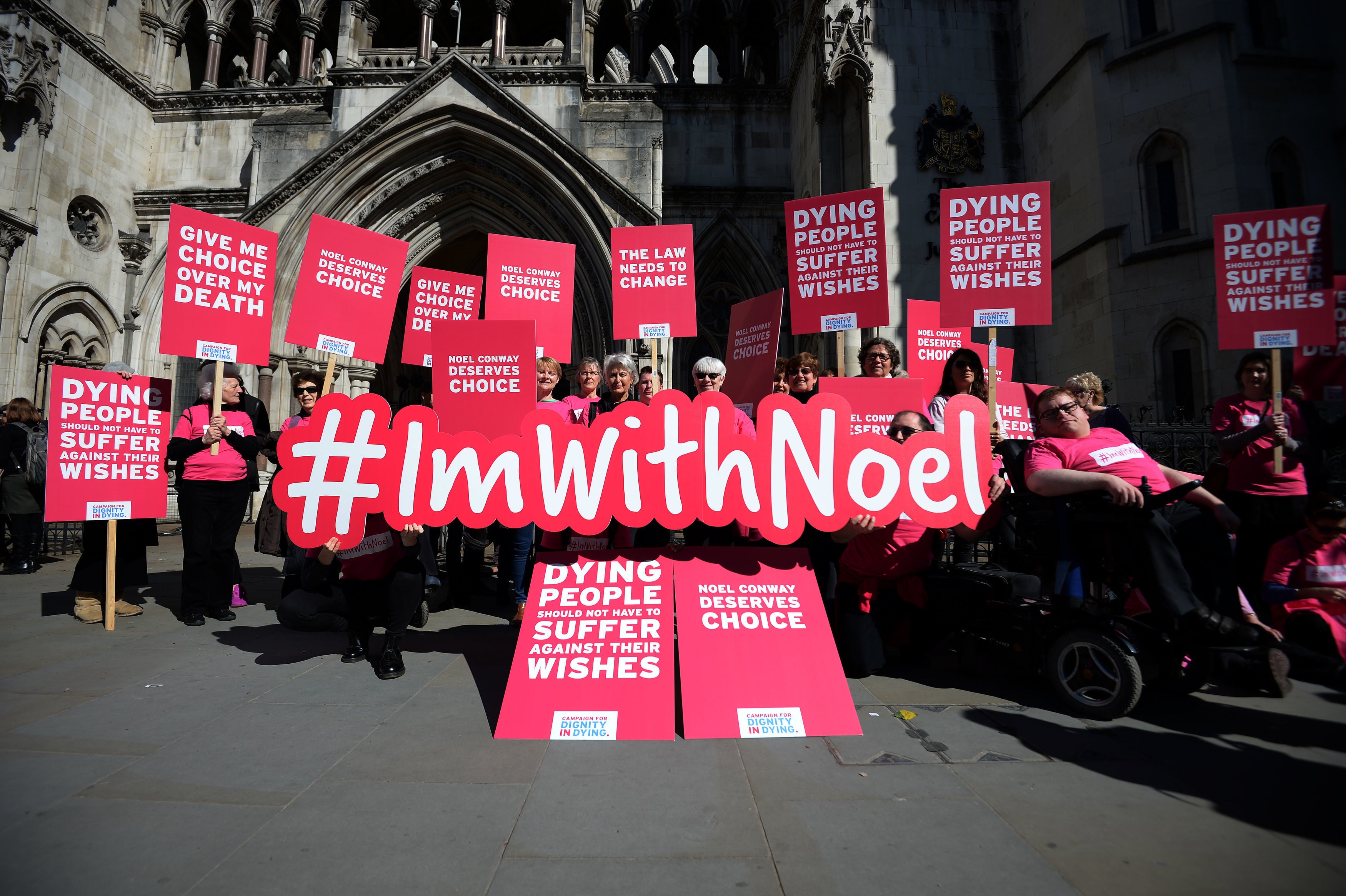
Dignity in Dying commissioned Populous to carry out the poll. Over many years, the organisation have advocated for terminally ill people to have empowered choice and control over end-of-life decisions.
Care not Killing, a UK-based alliance of individuals and organisations opposed to assisted dying, have tried to argue against the relative merits of this opinion poll.
However, Dignity in Dying believe that the right law for the UK is one that permits dying people, with six months or less to live, the option to control the timing and the manner their death.
Crucially, Dignity in Dying’s CEO, Sarah Wootton, told me that: “the law we’re calling for, which is for dying people to have that choice, should not be equated with a wish to die. If there was an option where they could live without their disease and be cured they would take that. The point is, they don’t have that option: it’s removed from them.”
For some, the contested issue of assisted dying is one of empowering choice. It is not necessarily the decision between living and dying, but a compassionate catalysis of a painful and inevitable death – beyond the help of even the best possible palliative care – controlled by the wishes of the individual.
Proponents of a change in the law believe that a line can be drawn between terminal illness and disability
“I think the suffering that some people undergo can be horrific,” she adds, “I think that has been a bit hidden and we shouldn’t hide the fact that it happens. Not everyone dies like that, of course they don’t, but if anybody dies like that, that’s wrong.
“Some people starve and dehydrate themselves to death, those who can pay go abroad to die, and some people ask loved ones to help. I feel like it’s absolutely scandalous that people are being forced into this very limited range of options. That only a few people should be able to pay to have a good death is morally indefensible and it doesn’t protect anybody.
“Being able to have these conversations in the open, to be able to have a safeguarded process where you can accelerate an unbearable dying process, to be able to have open access for everybody rather than just a few who can afford to get it, is clearly better and safer than the current situation. And 84 per cent of the public agree with us.” she adds.
Wootton believes it is a progressive liberal reform, it’s like many campaigns that went before it – votes for women, equal marriage, reproductive choice. Significant social reform comes from public pressure and it’s increasing all the time. She says that we will get law reform in the end, but how many Britons have got to die badly first?
However, for some, there is perhaps a more radical extension. My Death, My Decision are campaigning for a similar assisted dying law, though one which goes beyond Baroness Meacher’s bill. They argue that terminal illness should not be the only criterion, that there is a strong moral case for those with intolerable suffering from incurable conditions, who do not have six months or less to live, to be enabled to have an assisted death too.
Though the Assisted Dying Bill only applies to those with a terminal illness and a life expectancy of less than six months, the slippery slope argument is often invoked. That is, that an acceptance of assisted dying now will yield further, unintended, and unethical consequences down the line.
This has led to concerns from people with disabilities troubled by the prejudice of ableism which they see as cutting across the logic of assisted dying. Some disability activists feel that a legislative change to allow assisted dying – understood in its broadest sense – speaks to a wider societal disenfranchisement.
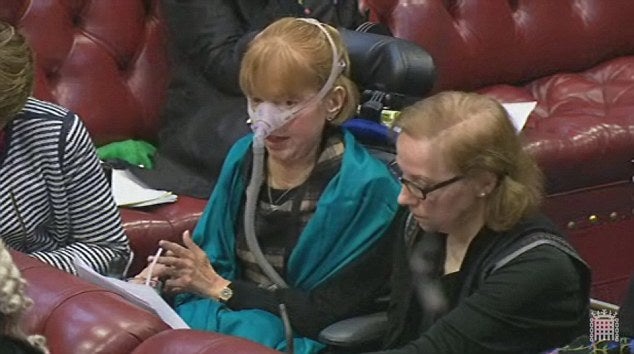
Baroness Jane Campbell, a life peer and founder of the organisation Not Dead Yet UK, wrote in the BMJ in 2019 that: “the distinction between disability and terminal illness is a false one: for many disabled people a chest infection is a terminal illness unless treated.
“Proponents of a change in the law believe that a line can be drawn between terminal illness and disability, she added. “But terminal illness and disability do not exist in a vacuum. We all have views about them. Often these views include widely held perceptions involving loss, decline, and fear of the future.
“It is hard to be positive as a disabled person, especially when the media is full of stories of abuse, neglect, cut-backs, and overstretched resources. Even when medical and social care are at their best, our fear of the future remains.”
However, writing in The Independent, Dr Stephen Duckworth said: “I have long been passionate about the right of disabled people to live well and with dignity, particularly since I had a serious accident in my younger years. Those of us who live with disabilities should be given the support and choices we need to enable us to live our lives on our own terms, and I believe that respect and freedom should extend to those with terminal illnesses who are reaching life’s end.
I don’t want to be alive to see it through to its bitter end. I would like to have an assisted death, in this country, at a time when I need it
“To my mind, that should include the option of an assisted death for people who are in their final months and in full possession of their mental faculties. The vast majority of the public, those with and without disabilities, agree.”
For balance, James Moore, also writing inThe Independent, has expressed worry about disabled people and the direction of the assisted dying debate. He cites a poor national disability strategy in the UK and a general disenfranchisement of disabled people as reasons for legitimate fear. The organisation Disabled Activists for Dignity in Dying (Dadid), though, represents a campaign for and by disabled people which supports a change in the law in favour of assisted dying.
There have been several high-profile campaigners in UK alone who have fought to reform the law for assisted dying. Having been diagnosed with motor neurone disease (MND) in 2014, Noel Conway died in June 2021 after campaigning to change the UK’s current ban and taking his appeal to the Supreme Court in 2018. In 2019, Geoffrey Whaley, also diagnosed with MND, published an open letter to MPs to request a change to the law written before his death at Dignitas.
At the age of 19, Louisa Eastland was diagnosed with relapsing-remitting multiple sclerosis. Decades later, another prognosis discovered that her condition had changed, becoming a type known as secondary progressive MS. Now 51-years-old, given the complications to come, she would want the choice of an assisted death in the future if she is suffering unbearably at the end of her life.
“I’m in a wheelchair most of the time and when we go out I can’t walk,” she told me. “I sleep in a hospital bed now because I started getting pressure sores when I was in a wheelchair all the time and so it feels a little bit like progression. This year’s been quite hard.”
And still, she says, nothing would make her to want to have an assisted death yet. But what she does know is that he life has already changed dramatically and it will continue to do so.
Eastland was a social worker, originally, and it was here she was taught how important your client’s wish for self-determination was. Nobody, she says, is talking about making people die when they don’t want to.
“I don’t want to be alive to see it through to its bitter end,” she says. “I would like to have an assisted death, in this country, at a time when I need it – when things are unbearable.” Under current law, this is impossible.
“What Baroness Meacher is proposing is a really, really safe law – that’s safer than Dignitas, even,” she says.
Eastland intends to travel to Switzerland – at great cost financially and emotionally – if the option is unavailable in the UK. With the force of the current law, doing so with the help could potentially implicate anyone involved under the charge of “assisting a suicide,” for which they could be investigated and even prosecuted.
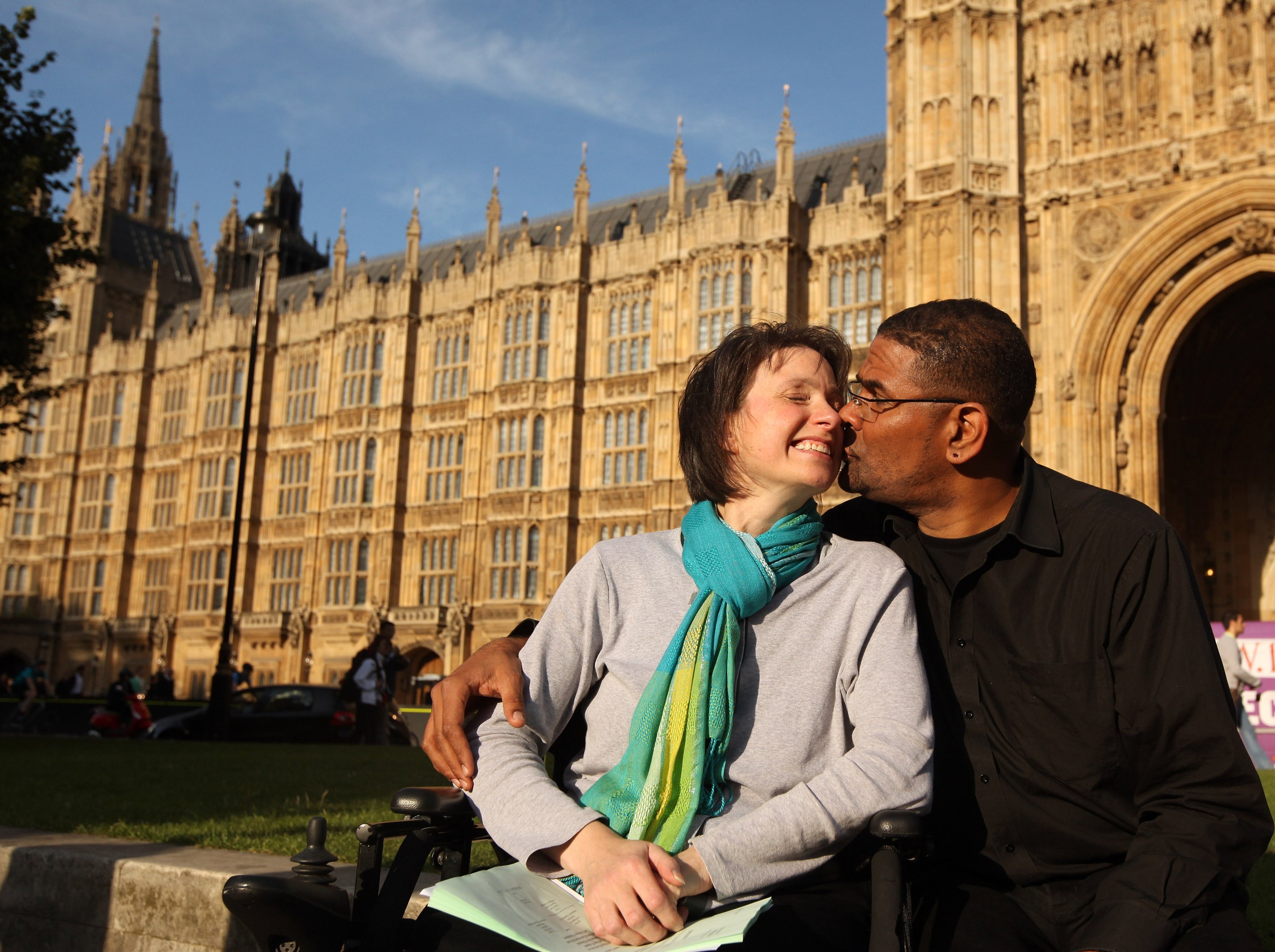
“If I wanted to go to Dignitas today I have to get there without anyone else’s assistance,” she says. “Theoretically, if I was going today that would be manageable, but we’re talking about when I’m much more ill. Debbie Purdy, in the end, wasn’t able to go because she didn’t have the funds and she was in a [Marie Curie Hospice] for about a year refusing food and water until she died. That’s not what I want to have happen to me.”
Debbie Purdy won a landmark verdict in 2008 to clarify the law on assisted dying. She argued that the Director of Public Prosecutions was infringing on her human rights by refusing to clarify how the Suicide Act 1961 was enforced, in particular whether or not her husband, Omar Puente, would be prosecuted if he helped her to Dignitas. She died in 2014 having lived with multiple sclerosis for almost 20 years.
“What I want to be able to do,” Eastland says, “is to have an assisted death in this country. And I start from the standpoint of ‘I don’t see why it shouldn’t be possible’. I want people to tell me why it’s not alright to do this. All I’m talking about is that I want an assisted death, for me, at the time of my choosing, and it will be led by me.”
There is a sense of piety attached to much of the opposition to assisted dying, rooted in the religious belief in the sanctity of life and moral demand to respect the natural order. Most advocates for assisted dying claim that the greatest opposition to the idea comes from conservative religious contingents within society. This certainly seems to be the attitude of Christian Action Research Engagement (Care), an evangelical organisation opposed to assisted dying.
But there is also a dynamic equilibrium. On the one hand, a kind of sacred compassion for humanity and the elimination of suffering; on the other, a more conservative devotion that preaches against assisted dying as an affront to the sovereignty of God.
Rabbi Dr Jonathan Romain is minister of Maidenhead synagogue, vice chair of Dignity in Dying, and founder and chair of what the Religious Alliance of Dignity in Dying. He told me that: “Of course there are religious objections, but actually there’s lots of people who are religious and in favour and the two are not incompatible.”
In a YouGov survey of more than 5,000 adults from May 2021, more than half (53 per cent) of people with a faith said their leaders were wrong to have campaigned to try and stop MPs from changing the law on assisted dying in 2015; only 22 per cent believed they were right to do so.
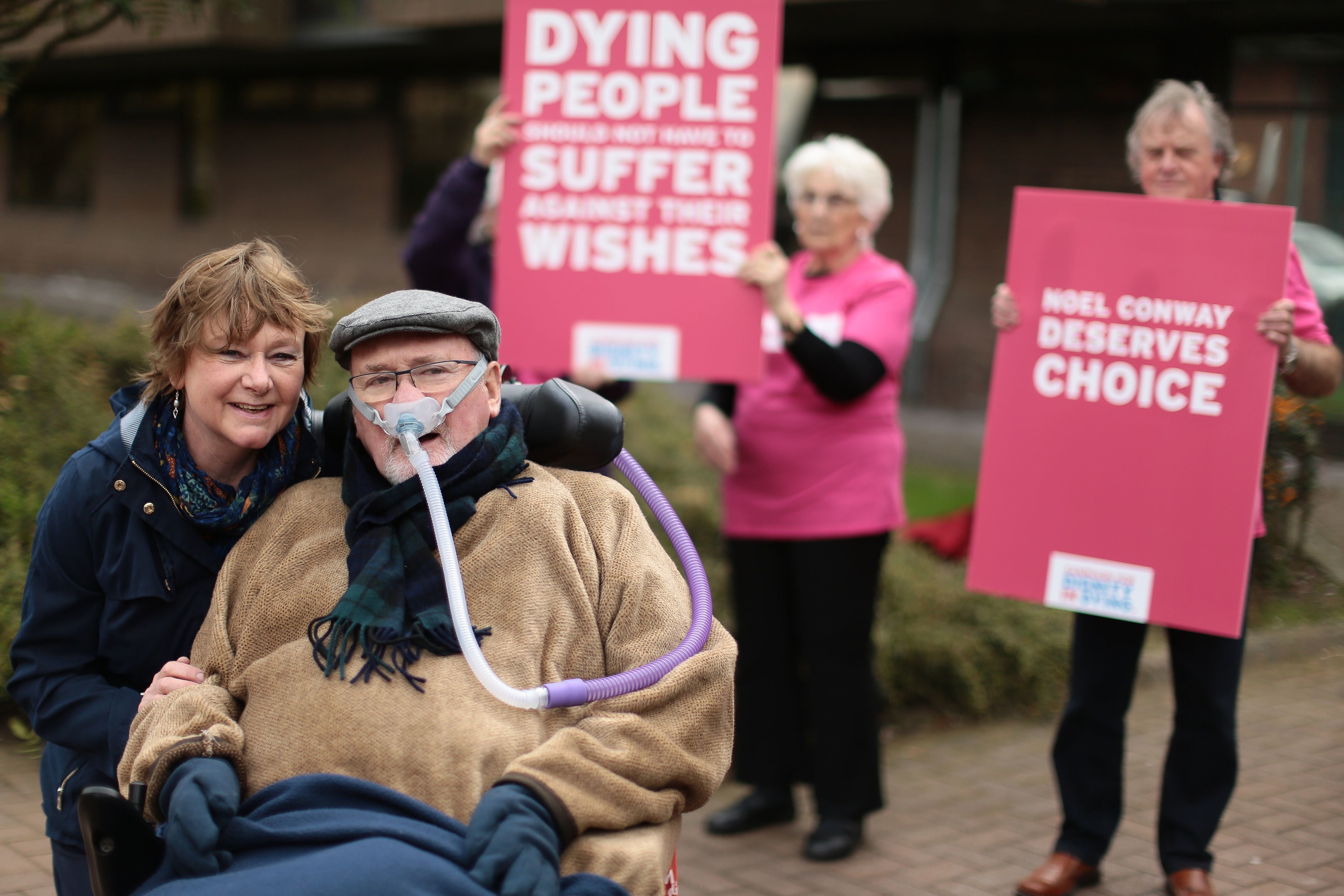
Equally, a Populus survey commissioned in 2019 found that 80 per cent of people belonging to a religion supported the legalisation of assisted dying for terminally ill adults with mental capacity, whether they would want the choice for themselves or not.
While the figure seems very high, there is a superficial misconception that all religious people are against assisted dying. A huge generalisation that Romain agrees is incorrect.
“At the end of the day religion is there to help people – certainly that’s my view of religion – and therefore if it avoids people suffering in pain against their will, surely, it’s a religious and compassionate thing to do?
Romain told me that he believes most people will carry on until their dying breath because that’s what human nature is, but that not everyone is fortunate to die in peace. “There’s nothing sacred about suffering, nothing holy about agony.” He believes that the only reason people are surprised at how many are in favour is because the traditionalists have very successfully pushed the line that being religious is against assisted dying
“That line was sort of taken for granted,” he told me, “because the Archbishop of Canterbury, the Catholic Cardinal at Westminster, and the Chief Rabbi all issued a joint statement together and therefore it was assumed. But actually, there is an enormous disconnect between what the leadership is saying and what the membership are thinking – both the lay membership but also many of the clergy themselves.
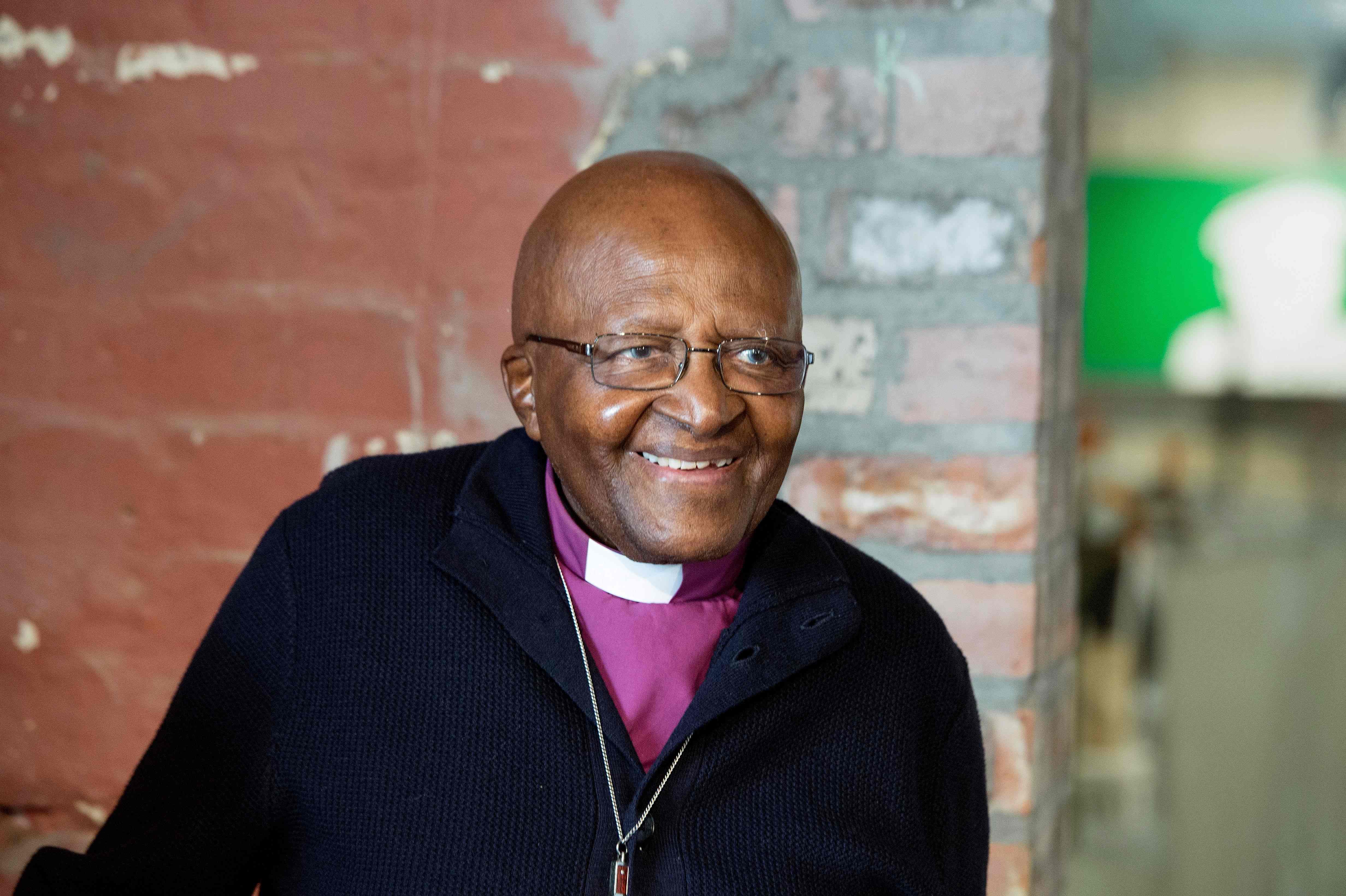
“And, again, that was why the Religious Alliance was formed; not to say faith has to be in favour – because obviously you can be against – but to say actually, it’s much more nuanced than you think. When you look at the figures, many people of faith – even the majority of people of faith – are in favour. Therefore, the official religious doctrines are out of step with what’s going on in religious life up and down the country.”
In many cases, it is perhaps more the political informing the religious than the opposite. And yet, there is also a groundswell of support from religious figures. Former Archbishop of Canterbury Lord George Carey has previously spoken in favour of assisted dying and supports a government review.
While, in 2016, after being diagnosed with prostate cancer, one of the world’s most iconic religious figures, Archbishop Desmond Tutu, said that dying people should have the right to a dignified assisted death and to choose how and when they leave the earth.
In a sense, assisted dying is a response to medical futility. But while death is inevitable and universal, terminal illness is entirely bound up with events, contexts, individual experiences, and relationships to life-ending conditions.
This may provide some way of understanding why the politics of assisted dying often seems so polarising: that non-dying people seem to be making decisions for those who are.
We must be open and unflinchingly empathic when talking about difficult topics, particularly where suffering is concerned, even if something of the opacity and ethically fraught nature of death makes it stigmatic for some. With transparent precision and compassionate sensitivity, the discussion must be responsive to the exact needs and suffering of terminally ill people.




Join our commenting forum
Join thought-provoking conversations, follow other Independent readers and see their replies
Comments